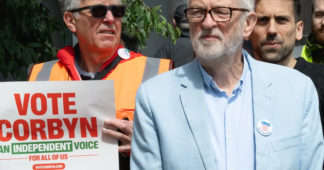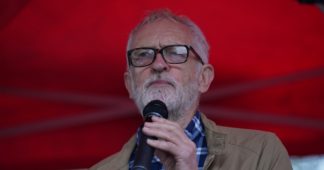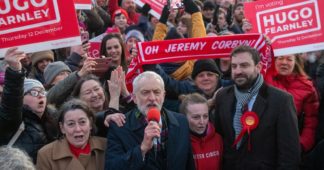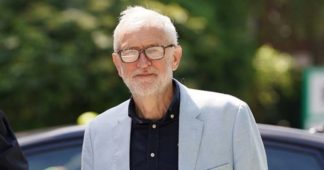Jeremy Corbyn’s first People’s Forum handed leadership over to the grassroots not the greedy, writes LINDA PENTZ GUNTER
Sep 26, 2024
“POWERFUL” and “invigorating” is how Streets Kitchen founder, Jon Glackin, chose to sum up the first Islington North People’s Forum, hosted last week by Jeremy Corbyn, that constituency’s longtime and now independent member of Parliament.
“The flames of hope burn brightly in North London,” Glackin said.
Unshackled by the strictures of the Labour Party, of which he was once the leader but now no longer a member, Corbyn is free to host events of his own creation and initiative. The People’s Forum was his first such venture.
“Our politics is made stronger when the political demand for decent housing, for better pay, for peace, for environmental sustainability, comes from grassroots, environmentally friendly type meetings like this,” Corbyn told a packed room of around 200 constituents with many others watching online.
Thursday’s Forum was the first of what Corbyn intends to be a regular series, held at different times and in different wards and covering a variety of topics important to local residents.
“It’s an experiment,” he said. “What doesn’t work we’ll abandon, what works well we’ll continue with.”
The Forum focused on housing, a topic of intense interest in the constituency given the level of housing insecurity brought about by the private renteral market which makes most available housing unaffordable.
While there were also invited speakers, constituents grouped around tables by ward were encouraged to engage with each other and come up with their own ideas on ideal housing systems. These were fed back to the Corbyn team for later review and to inform strategy and policy in the future.
For invited speaker Morag Gillie, a campaigner with the Islington branch of Homes For All — a grassroots alliance of tenants, trade unionists and local housing campaigns — the way forward is clear. “The only solution to the housing crisis is council housing,” she said, and there is one simple way to achieve that. “Tax the rich. That would solve the housing crisis immediately.”
Gillie noted that between 1946 and 1978, the total number of new council homes built each year across the country never fell below 100,000. Between 2022 and 2023 just 12,103 were completed.
There was inevitable scepticism in the room about whether the Starmer government’s proposed solutions to the housing crisis, including the promises contained in its Labour’s Renter’s Rights Bill, would actually materialise.
Corbyn hoped they would but cautioned that those promises came with vague statements that lacked information about where the houses would be built, what form they would take, and, most importantly, “what the definition of ‘affordability’ was. I get alarmed when people tell me they want to build for affordable rent without ever defining who it’s affordable for,” he said.
The Renters’ Rights Bill also contained deficiencies, Corbyn said, for which he would be proposing amendments.
Rent can become suddenly unaffordable, often through no fault of the tenant, said Fredi Gentz, a north London area organiser with Acorn, a union of grassroots working-class activists. To prevent unfair evictions, Acorn uses direct action tactics including blockades and occupations.
Gentz described an instance when a tenant who had inherited his late brother’s debt faced eviction. “We organised a hundred of his neighbours to come and link arms around the house and block the bailiff’s way,” he said, allowing for the situation to be resolved in court.
On another occasion, the group occupied a landlord’s office until he agreed to deal with chronic black mould in his properties.
“All it takes is for people to come in and make a little bit of noise and suddenly the money to do those repairs is there,” Gentz said.
“The solution always lies in the community,” said Glackin, the founder of Streets Kitchen, which supports and feeds the homeless in some of the more stressed areas of London. Streets Kitchen, he was quick to point out, “is not a charity. We want to be political. We want to call out those in power.” The group’s slogan is “solidarity not charity.”
As a grand experiment of the left there were, inevitably, critics. For some, the meeting was not political enough, should have addressed Gaza, and failed to lay out a strategic plan for an independent movement or possibly a new political party.
But whereas in the past, many looked to Corbyn to lead them to a brighter future, he has clearly reversed that agenda. For a new movement to succeed, he said, it must be “a bubbling up” of ideas and initiatives from the grassroots to the national level, not driven by policy made by experts behind closed doors.
In other words, put the decisions in the hands of the people, not the powerful.
* Linda Pentz Gunter is a writer based in Takoma Park, Maryland who is currently covering events in London.
We remind our readers that publication of articles on our site does not mean that we agree with what is written. Our policy is to publish anything which we consider of interest, so as to assist our readers in forming their opinions. Sometimes we even publish articles with which we totally disagree, since we believe it is important for our readers to be informed on as wide a spectrum of views as possible.











